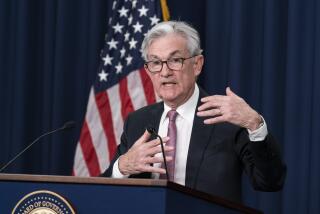China Set to Pay High Costs to Cut Inflation
- Share via
BEIJING — China is prepared to accept sharply reduced economic growth and increased unemployment in 1989 in a bid to reduce inflation, which was 26% last year, a government spokesman said Friday.
The government is aiming this year for an increase of 7.5% in the gross national product, after a rise of 11.2% last year, State Council spokesman Yuan Mu said at a news conference. (The State Council is China’s equivalent of a Cabinet.)
The lower rate is to be achieved largely by holding the growth of industrial production to 8%, down from 17.7% last year, and by a 22% reduction in investment in fixed assets, Yuan said. This is likely to cause unemployment to rise to about 3%, up from 2% in 1988, he said. Social security programs will ensure that the livelihood of unemployed workers is assured, he added.
Anti-inflation measures announced in September have had some effect, Yuan said. Inflation peaked in October, when prices were 27.1% higher than in October, 1987, and has decreased slightly since then, he said.
More Agriculture Investment
“Although the masses are still unsatisfied with the price increases, they complain less about the situation,” Yuan said. “The panic-buying that occurred in various parts of China last year has subsided.”
Prices for the 12-month period ending Dec. 31, 1988, rose by 26%, Yuan said, adding that the government hopes to reduce inflation by about 3 to 5 percentage points this year. The government wants a clearly visible, but not too drastic, reduction in inflation, he said.
“Too much haste in this regard would not help our economic development,” he said.
Although China seeks to slow its overheated industrial growth in order to ease bottlenecks in raw material supply, energy and transportation, and thus help reduce inflation, investment in agriculture will be increased, Yuan said.
Agricultural output, which grew 3% in 1988, is targeted to rise 4% this year, he said.
China’s foreign exchange reserves at the end of 1988 stood at $18 billion, he said.
Yuan denied that China plans to devalue its currency. He acknowledged, however, that the Foreign Enterprise Service Corp., or FESCO, in Beijing, a government-run company through which foreign firms are required to obtain most of their local workers, recently demanded that the fees it charges for its personnel be pegged to foreign currency rather than to Chinese yuan.
This would have meant that the amount in yuan paid to FESCO in return for its provision of Chinese workers would have gone up sharply in response to any devaluation of China’s currency. The demand was widely viewed by foreigners in Beijing as an indication that the government expected to devalue the currency in the near future.
Yuan said Friday that FESCO had made the demand without proper authorization, that it was wrong to do so, and that the demand “has now been canceled.”
More to Read
Sign up for Essential California
The most important California stories and recommendations in your inbox every morning.
You may occasionally receive promotional content from the Los Angeles Times.










